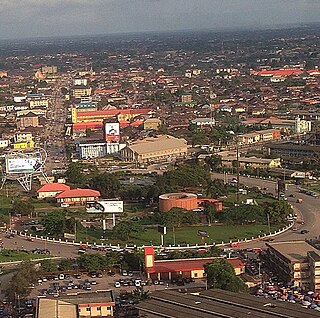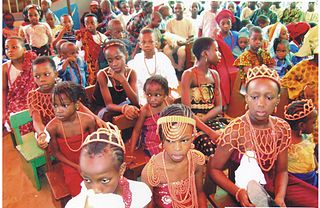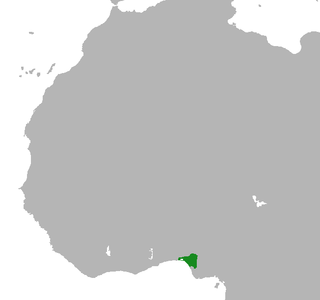Related Research Articles

Benin City is the capital and largest city of Edo State, southern Nigeria. In central Kings square, the Benin city National Museum traces the Benin empire and has displays of terracotta sculpture. The Oba's palace is known for bronze plaques that once decorated with the walls, depicting historical events and Life at court. It is the fourth-largest city in Nigeria according to the 2006 census, after Lagos, Kano, and Ibadan. It is situated approximately 40 kilometres (25 mi) north of the Benin River and 320 kilometres (200 mi) by road east of Lagos. Benin City is the centre of Nigeria's rubber industry, and oil production is also a significant industry.

The Oba of Benin is the traditional ruler and the custodian of the culture of the Edo people and all Edoid people. The then Kingdom of Benin has continued to be mostly populated by the Edo.

Ewuare was the Oba (king) of the Benin Empire from 1440 until 1473. Ewuare became king in a violent coup against his brother Uwaifiokun which destroyed much of Benin City. After the war, Ewuare rebuilt much of the city of Benin, reformed political structures in the kingdom, greatly expanded the territory of the kingdom, and fostered the arts and festivals. He left a significant legacy and is often considered the first King of the Kingdom of Benin.

The Edopeople, sometimes referred to as the Bendel people, are an Edo-speaking ethnic group. The oredo who predominantly reside in 7 southern local government areas of the State of Edo, Nigeria are known as Benin. They are speakers of the edo language and are the descendants of the founders of the Benin Kingdom Ogiso Igodo. They are closely related to other southern Nigerian tribes, such as the Esan, the Etsakọ, the Isoko, and the Urhobo.

The Kingdom of Benin, also known as the Edo Kingdom or the Benin Empire, was a kingdom within what is now southern Nigeria. It has no historical relation to the modern republic of Benin, which was known as Dahomey from the 17th century until 1975. The Kingdom of Benin's capital was Edo, now known as Benin City in Edo State, Nigeria. The Benin Kingdom was "one of the oldest and most developed states in the coastal hinterland of West Africa". It grew out of the previous Edo Kingdom of Igodomigodo around the 11th century AD, and lasted until it was annexed by the British Empire in 1897.
Eseohe Arhebamen or Eseohe Arhebamen-Yamasaki, also known as Edoheart, is a poet, dancer, singer, musician, producer, performance artist and visual artist. Eseohe was born in Zaria, Nigeria and is descended from a royal family of the Benin Empire. Eseohe Arhebamen's maternal grandmother is Princess Theresa Maria Nodumwenben Osazuwa, a princess of the Edo people. Eseohe Arhebamen's great-grandfather Osazuwa Eredia, the father of Princess Theresa Osazuwa, was the Oba N’Ugu and Enogie of Umoghumwun, making Eseohe Arhebamen a royal descendant and princess. "The foundation of the kingdom of Ugu, with its capital at Umoghumwun has been traced to Prince Idu, the eldest son of Oba Eweka I."
Igodomigodo is the original name of the Benin Empire used by its own inhabitants.

Ewu is a Nigerian town situated in Esan Central Local Government Area in the Edo State of Nigeria. The city, an Esan tribe, lies on 200 feet in the plateau region of central Edo State, 100 kilometres north of Benin City, the capital of Edo State, Nigeria.

Ọmọ n'Ọba n'Ẹdo Uku Akpọlọkpọlọ, Akenzua II was the Oba of Benin The Edo people of Nigeria, He ruled from 1933 until his death in 1978.
Unuamen also spelt Unuame is an ancient village community by Ovia river in Ovia North-East Local Government Area of Edo State, Nigeria. Unuame is about 15 kilometres (9 mi) from Benin City and 20 kilometres (12 mi) from Benin Airport. Unuame is one of the ancestral homes of Oba Esigie's maternal grandfather and home town to some group of Binis. The people of Unuame have remained loyal to the monarch since the establishment of the ancient Kingdom of Benin. Being a part of the Kingdom of Benin, Unuame is at the heart of the tropical rainforest in the southern part of Nigeria, way to the west of the delta of the Niger River and inland from the coast.
Uokha lies on the latitude 7 07’N and longitude 6 04’E in a deciduous derived rainforest zone of Edo State. The climate is sub humid tropical with an average annual rainfall of about 1967mm. Uokha is a town in Owan East, a local government area of Edo state, Nigeria. It is located about 123 km northwest of Benin city the capital city. It has a population of approximately 10,000 inhabitants.
Igun Street, also known as Igun-Eronmwon Quarters, is a street situated in Benin City, Edo State, Nigeria. This street is renowned for being the residence of the Guild of Benin Bronze and Brass Casters, known as the Igun-Eronmwon. It holds the designation of a UNESCO World Heritage Site. Notably, it stands as the second most frequented tourist attraction within Benin City. Tourists, art dealers, and collectors routinely visit Igun Street to observe the comprehensive process involved in crafting these objects.
Delaiso or Laiso is a morning greeting (ukhu) in Edo State, Nigeria, primarily associated with individuals whose family heritage can be traced back to the historic Ogiso Dynasty. The term "Delaiso" is a combination of the Edo words "Dela," meaning "good morning," and "Oiso," signifying "Ogiso," the ancient rulers of the region.

Oba Oguola was a ruler of the Benin Kingdom, reigning from 1280 AD to 1295 AD. His reign was marked by achievements in fortifying the city of Benin, enhancing its defenses, and contributing to the cultural and economic development of the kingdom. Born into the royal family, Oguola's ascent to the throne was prompted by the extended absence of his elder brother, Prince Obuobu, who was engaged in military campaigns. This unorthodox succession was a pragmatic decision by the kingdom's elders and advisors to ensure stability and effective leadership during a critical period.
Eweka I was a monarch in the history of the Benin Kingdom, overseeing an era during the transition from the Ogiso Dynasty to the Obaship. His 35-year reign had a notable impact on the political, cultural, and traditional aspects of the kingdom.
Akengbuda was the Oba of Benin from 1750 to 1804. He was the son and successor of Eresoyen, and the father of Obanosa. He is regarded as one of the most powerful and influential obas in the history of the Kingdom of Benin, as he expanded the kingdom's territory, improved its administration, and promoted its arts and culture. He also maintained a strong trade relationship with the Europeans, especially the Portuguese and the British, and acquired firearms and other goods from them. He was known for his military prowess, his diplomatic skills, and his patronage of arts and learning.

The Igbesanmwan is a hereditary guild of ivory carvers in the Benin Kingdom, a pre-colonial African state located in present-day Edo State, Nigeria. Members of the Igbesanmwan guild hold the responsibility of crafting ivory items, including masks, tusks, staffs, leopards, and various other symbols denoting royal authority and eminence, for the Oba (king) and the royal court. In addition to their ivory craftsmanship, the Igbesanmwan possess proficiency in working with a range of other materials, such as wood, brass, and coral. This guild is recognised as one of the most ancient and esteemed in Benin, with their artistic work being widely appreciated for its aesthetic appeal and technical mastery.

Ewedo, originally known as Prince Efabo, was the fourth Oba of the Kingdom of Benin who reigned from 1255 AD to 1280 AD. He was the only son and successor of Ehenmihen. He is credited with moving the seat of his government from Usama to the present palace site, introducing various gods and laws, and changing the name of the country from Ile or Ile-Ibinu to Ubini (Benin). He also reformed the political and administrative system of the kingdom, established a palace bureaucracy, and expanded the territory and influence of Benin.
The Battle of Ekiokpagha was a historical event that took place in 1255 AD on the Plains of Ogboka, near Benin City, between Oba Ewedo of the Benin Empire and Ogiamien III, the leader of the indigenous people of the land. The battle was a result of a power struggle between the two parties, who had different claims to the throne and the territory of Benin. The battle ended with the victory of Oba Ewedo, who established his palace at the present site, and the recognition of Ogiamien III as a chief under the monarchy. The battle and its aftermath have been reenacted in the coronation rituals of the subsequent Obas of Benin, as a symbol of the historical and traditional enmity between the Oba and the Ogiamien family.
Uwakhuahen was the second Oba of the Kingdom of Benin, reigning from 1235 AD to 1243 AD. He was the son of Eweka I, the initiator of the Oba dynasty and the inaugural ruler to bear the title Oba. Upon the demise of his father, he ascended to the throne, although he did not designate an heir apparent.
References
- ↑ "Precolonial Nigeria: Essays in honor of Toyin Falola" Africa World Press. 2005. Retrieved January 20, 2012.
- ↑ Osadolor Osarhieme, Benson (23 July 2001). The Military System of Benin Kingdom, c.1440 - 1897 (PDF) (Doctoral thesis). University of Hamburg, Germany. p. 21. Retrieved 5 April 2010.
- ↑ ["Evolution of Benin chieftaincy titles (pages 124-125)".] Eweka, E. B.
- ↑ Osadolor Osarhieme, Benson (23 July 2001). The Military System of Benin Kingdom, c.1440 - 1897 (PDF) (Doctoral thesis). University of Hamburg, Germany. pp. 77–78. Retrieved 5 April 2010.
- ↑ ["Evolution of Benin chieftaincy titles (pages 124)".] Eweka, E. B.
- ↑ Osadolor Osarhieme, Benson (23 July 2001). The Military System of Benin Kingdom, c.1440 - 1897 (PDF) (Doctoral thesis). University of Hamburg, Germany. p. 78. Retrieved 5 April 2010.